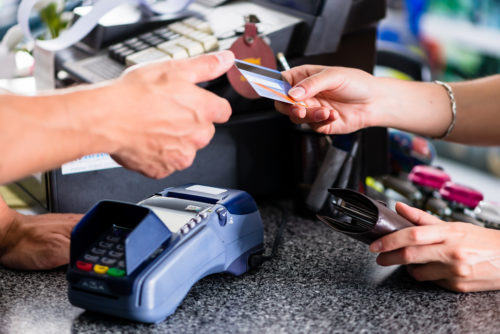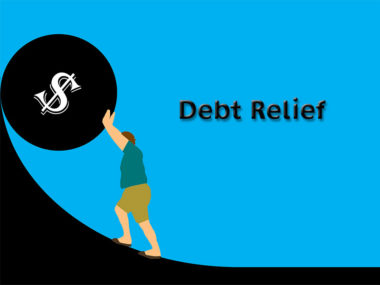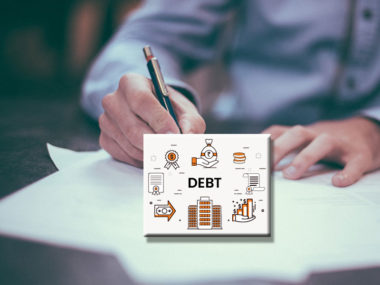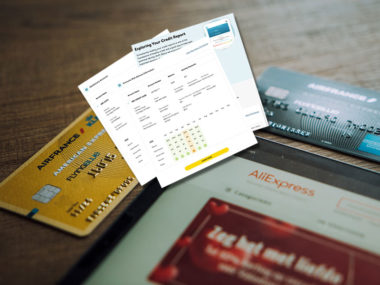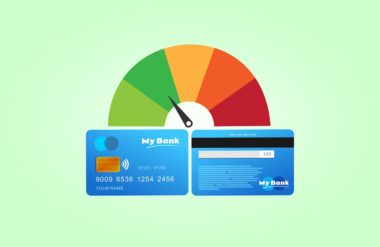It’s incredibly easy to sign up for in store credit cards, especially when they offer a term without fees, a sign-up bonus, plus the promise of additional rewards, and a percentage off of your total purchases. However, having a few of these cards in delinquency can really destroy your credit score.
If you’re someone who’s fallen victim to the pull of in store credit cards and let your shopping habit get out of control, your credit score could be failing. Failure to pay off your credit cards on time and maxing out several lines of credit does not look good on your history. However, you can begin to remedy the situation right now by chipping away at your credit card debt while improving your credit score long term in the process.
Table of Contents
How Are Store Credit Cards Hurting Me?
The biggest ways that store credit cards are affecting your credit score are through late payments and credit utilization ratio. Let’s say you have five store credit cards and they’re all maxed out; your credit utilization ratio is high because you’re using all of the available credit offered to you. If you put some late payments on top of that, it does not make for a good credit score. However, the cards themselves aren’t bad. Having a couple credit card accounts open, that you feel comfortable with and can manage, can be extremely beneficial to your credit score. First, let’s talk about how we can start to make them more manageable.
How Can I Pay Off All of My Cards?
Paying off your credit cards completely entirely depends on what state your lines of credit are currently in. If you have one store credit card that is maxed out, but you have no others, I would suggest simply trying to organize your budget so that you are certain you can make your monthly payments on time.
Whenever you can make extra payments, I highly encourage you to do so, in order to eventually pay off your balance in full. Credit cards come with interest charges on whatever you don’t repay each month. Once you have a maxed out card, it can be hard to start lowering that balance unless you are dedicated to paying a bit more than the minimum payment required. You’ll be slapped with an interest charge each month even if you pay your minimum, which can make it feel like you’re making zero progress. If you work on paying a little extra as frequently as you can, you’ll ultimately see the balance go down.
Debt consolidation might be an option for you if some (or all) of your credit cards have been sent to collections. You’ll have to check with the loan issuer, debt collector, and your bank to see if this is an option they will allow, but if it is a possibility, it can make things a bit easier for you. Commonly, you would be offered a loan to pay off all of your debts, then you will work on paying off that loan over time. This can make your loan easier to keep track of instead of several different accounts. It can also sometimes mean a lower monthly payment since you’re just paying off the one loan instead of many, and loans often carry a lower interest rate than credit cards.
Should I Close the Accounts Once They’re Paid Off?
Not necessarily. It all depends on your current relationship with your credit cards. If you have several cards and you’re working on paying them all off, focus on that before you think about closing any accounts. Once you have them paid off, or the balances are at least in a manageable range for you every month, think about which ones could possibly benefit you in the long run.
Here’s the tricky thing about credit cards: nothing positive happens to your credit score when you close a credit card account. In fact, the credit bureaus want to see that you have much more credit offered to you than you are actually currently utilizing (this is known as your credit utilization ratio, and it is a standard factor in calculating your overall credit score). That also means that if you want to keep a card, you should still use it occasionally. Keep the balance low, but charge small things to it that you know that you can pay off quickly. By doing so, you’ll be able to add some positive information to your credit history that will help your score go up over time.
Another thing to consider is the age of a credit card account. The credit bureaus also look at how long your account has been open. An account that has been open for three months and has already been maxed out and had a late payment, does not look good and it will have a larger impact on your credit score than another account that has been open for longer. If you’ve been able to keep a credit card account open for years and show a history of using the card and paying it off over time, a late payment or maxing it out is less likely to greatly affect you. There is still an impact, but it will be much less of a mark on your credit than if it was a fresh account.
When Should I Avoid New Store Credit Cards?
We’ve gone over why and how to pay off your credit cards as well as why you should think about keeping some of them open after they’re paid off. However, just because they are good for your credit doesn’t mean they are good for you. Yes, an open account that is paid off does look better than no account; at least it keeps counting toward your age of credit. Yet, at what point is it just too much? At what point is it time to say no to a new credit card?
I’d say keep your cards to a point when you are feeling comfortable, before you become overwhelmed. Having a few credit cards that you know you’ll use occasionally and be able to pay off, is good. Having an overwhelming number of cards that you could lose track of is not a good thing. If you don’t feel like you’re ever going to remember to use a specific store credit card because you forget about it, maybe think about closing it. If you’re afraid that you’ll charge something to it and then forget about it, that’s an even better reason to close it. That could do some serious damage to your credit without you even knowing about it.
Use your best judgement when deciding which cards to keep and which to get rid of. If you feel that a certain store credit card will save you money, give you awesome rewards, and you can keep it under control, that’s probably a good investment. Remember, paying on time and keeping the balance low is essential if you want it to positively affect your credit score. The age of your account will also help your credit score once you’ve got a nice amount of history through that card.
Looking for more credit card tips and guides? Visit our resource center. How can you improve your credit score? Visit the credit score resource center to find out.
